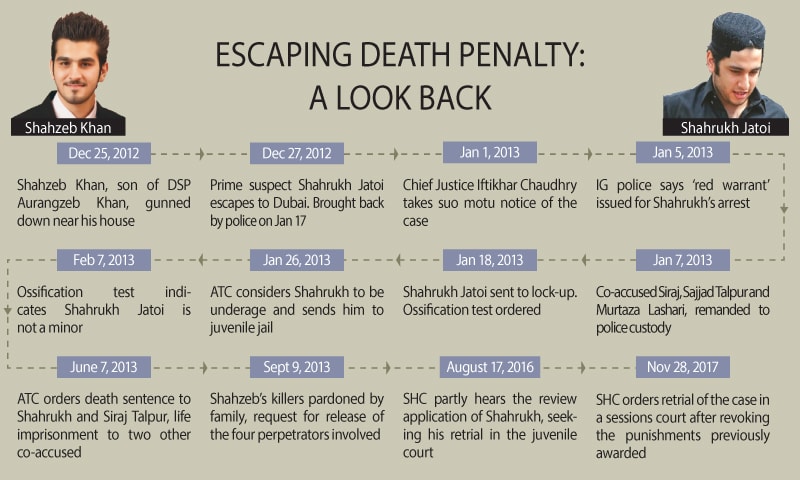All murders are gruesome but some are so depraved that they compel people to speak out against injustice and skewed criminal justice systems that seem to absolve the rich and indict the poor.
This was the case with Shahrukh Jatoi’s murder of Shahzeb Khan on Christmas day in 2012. It rallied people together, particularly the youth, who demanded that Jatoi be punished.
The following year, an Anti-Terrorism Court (ATC) sentenced Jatoi and one of his accomplices to death and sentenced two others involved in the murder to life imprisonment.
The case, however, came back to light when a criminal review application was filed by Jatoi’s lawyer in August, 2016.
This past November, the Sindh High Court (SHC) revoked the sentences and ordered a retrial to be carried out in a regular court.
Jatoi’s counsel had argued that their client was a juvenile at the time of murder and should not have been tried by an ATC. They also added that the murder was a result of personal enmity, which is different from terrorism.
In response to the SHC decision, a citizen's petition was filed at the start of this year in the Supreme Court, demanding that Jatoi’s conviction by the ATC stands valid.
The petition, supported by several well-known citizens, refers to the legal definition of terrorism in the Anti-Terrorism Act of 1997, whereby:
“‘Terrorism’ means the use or threat of action where … The use or threat is designed to coerce and intimidate or overawe the Government or the public or a section of the public or community or sect or create a sense of fear or insecurity in society…”
This definition of terrorism includes ordinary urban crimes as long as the claim can be supported that the crime in question struck terror, panic and fear among people in a section of society.
Unfortunately, the petition is misplaced as it relies on an overbroad and vague definition of terrorism – a definition which is need of revision.
While securing the conviction of a known murderer is a good aim, especially when the defendant is powerful and can influence the lower courts, the arguments in the petition give rise to several issues that need to be addressed.
First: what is terrorism?
What we understand by ‘terrorism’ should be restricted to groups like the TTP, LeJ, JuD, JUA, ISIS and other similar outfits who have caused widespread mayhem in the country.
They have indiscriminately bombed minority places of worship and public areas; killed students; carried out calculated murders of members of various minority communities; and waged a war against the state and society.
Their motive is to exert control and dominion through terror.
Which leads to the second question: was Shahzeb’s murder an act of terror?
The murder was dreadful, the consequences were tragic, and the victim’s family deserves unlimited support and compassion.
Having said that, the murder should not qualify as terrorism even if elements of power, aggression, and deliberate intimidation were part of it.
This is because the murder doesn’t compare to the acts of the above-mentioned groups in terms of ideological motivations and political goals, which are sustained through funding, organising and sheer application.
Third: is there a difference between motive and mens rea?
Motive for murder is not the same as mens rea for murder. The former constitutes reasons for the act; these could be personal, revenge, provocation, aggression, or show of power.
The latter is the fault element in killing and is satisfied as long as Jatoi used his weapon to kill intentionally.
A motive to spread terror, versus the impact of it as causing the same, is a different thing altogether and should not be confused with mens rea.
Fourth: there is a misconception that Jatoi has been acquitted or a coerced settlement has been permitted by the court – and that he has already evaded justice.
The case will be retried in an ordinary sessions court. This means that Jatoi and his co-accused will have a second shot at justice; it does not, however, mean that he is, or will be, automatically absolved of his crime.
Fifth: what are the real legal injustices at play that privilege the rich over the poor in criminal cases? Coercion of poor families to forgive the killers who are rich – isn’t that the real issue?
Since Qisas and Diyat laws allow convicted murderers to be forgiven by victims’ families (which is not a provision in ATCs) the very idea of a new trial invokes the fear that Jatoi’s powerful family will coerce a settlement from Shahzeb’s family (which they have already tried to do) or that the judge will acquit.
Considering the indisputable evidence in the case, an acquittal is unlikely but a settlement is quite likely.
Settlements under Qisas and Diyat should therefore be the battleground for activists and progressive lawyers, rather than fighting for the implementation of an expansive interpretation of ‘terrorism.’
At the same time, it should be kept in mind that an outcry against private settlements is not possible. To oppose Qisas and Diyat would be to oppose laws that carry the hue of Sharia and are enacted, ostensibly, to make our laws more compliant with an elusive Islamic ideal.
Nonetheless, legal mechanisms are still available to prevent these settlements. Courts can disallow private settlements in murder cases where there are aggravating circumstances.
According to Section 311 of the Pakistan Penal Code, if the murder is shocking or if it outrages the public conscience, then the court, in its wisdom, may forbid any forgiveness or a payout, and send the defendant to jail.
This is important since the wholesale privatisation of justice where victims’ families can forgive murderers weakens the writ of the state.
It constricts the judiciary’s power and provides a legal stamp of approval to the rich and the powerful paying their way out of crime.

Shahzeb’s murder was shocking and Jatoi deserves punishment. However, it was not a case of terrorism.
The argument that cases like these should be heard in an ATC is based on a faulty logic. If so, every case of murder will have to be referred to an ATC.
By extension, the existing definition of terrorism also needs to be changed so as to focus on recognised terror outfits and not run-of-the-mill crimes.
Existing laws allow regular courts to deny a private settlement and issue a fair sentence. Our efforts, therefore, should be on these courts to make sure they uphold justice.
































